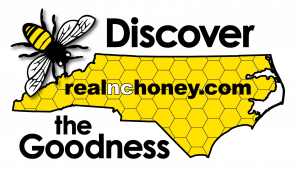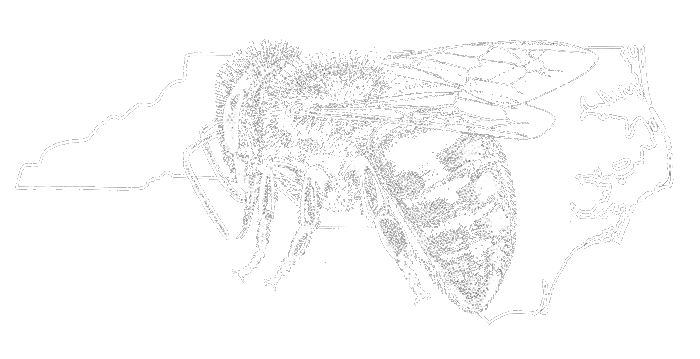 North Carolina beekeepers and their bees produce the highest quality, most trustworthy and just generally tastiest honey. Honey consumers should check out RealNCHoney for guidance to the best apiary products available in the state. If you are a beekeeper in North Carolina, you will want to learn more about the North Carolina Certified Honey Producer Program. You will also want to know what is blooming in your area and what kind of nectar your bees are bringing back to the hive.
North Carolina beekeepers and their bees produce the highest quality, most trustworthy and just generally tastiest honey. Honey consumers should check out RealNCHoney for guidance to the best apiary products available in the state. If you are a beekeeper in North Carolina, you will want to learn more about the North Carolina Certified Honey Producer Program. You will also want to know what is blooming in your area and what kind of nectar your bees are bringing back to the hive.
Frequently Asked Questions-Honey
Generally the lighter the honey, the milder the flavor. If a stronger flavor is desired for your recipe, use a darker, stronger flavored honey; if a more delicate flavor is desired, use a lighter, milder flavored honey.
Due to honey’s ability to retain water, products made with honey tend to remain moist longer than similar products made with other sweeteners.
Some minor adjustments may need to be made to a recipe when substituting honey for sugar:
- Use equal amounts of honey for sugar up to one cup. Over one cup, replace each cup of sugar with 2/3 to 3/4 cup over honey depending upon the sweetness desired.
- Lower the baking temperature 25 degrees and watch your time carefully since products with honey brown faster.
- In recipes using more than one cup honey for sugar, it may be necessary to reduce liquids by 1/4 cup per cup of honey.
- In baked goods, add 1/4 teaspoon of baking soda per cup of honey if baking soda is not already included in the recipe. This will reduce the acidity of the honey, as well as increase the volume of your product.
- Moisten a measuring spoon or cup first with water, oil, or an egg before measuring the honey to prevent it from sticking to the measuring utensil. Honey is heavy by weight. A 12 ounce jar equals one standard 8 ounce cup. A quart weighs 3 pounds.
Info sources: National Honey Board and cooks.com
DO NOT store honey in a refrigerator. It accelerates the honey’s crystallization.
Crystallization is the natural process of glucose sugar molecules aligning into orderly arrangements known as crystals and is not an indicator of spoilage, impurity, age or quality.
For PLASTIC containers, you may use hot tap water.
Source info: National Honey Board.
- Heating honey can change the color and flavor, even at a low temperature.
- Microwaving honey may destroy beneficial enzymes. (American Bee Journal, March 2007)
- Microwaving plastic may melt the container and release harmful chemicals.
- Overheated honey can easily explode, causing a serious and difficult to clean burn (think stuck on syrup burning into your skin).
- Crystals often remain, even when part of the honey is boiling.
- Hot water is just as effective.
Some sources say it is ok to microwave honey, IF MICROWAVE POWER IS REDUCED to 50%. However, hot tap water works just as well.
With appropriate control, many diabetics and pre-diabetics can enjoy natural honey. Honey contains other carbohydrates, not just sugar. 1 tablespoon of honey has approximately 17 grams of carbohydrate. Taking that into account when counting total daily intake of carbohydrates, diabetics can work it out just like any other sweetener or carbohydrates.
Some people believe honey to have outside benefits for diabetics.
Generally, there’s no advantage to substituting honey for sugar in a diabetes eating plan. Both honey and sugar will affect your blood sugar level.
Honey is sweeter than granulated sugar, so you might use a smaller amount of honey for sugar in some recipes. But honey actually has slightly more carbohydrates and more calories per teaspoon than does granulated sugar — so any calories and carbohydrates you save will be minimal.
If you prefer the taste of honey, go ahead and use it in moderation.
Source: www.mayoclinic.org
Their reasoning for this conclusion is based on several facts:
Scientifically-controlled clinical testing has not produced empirical evidence to support the claim that honey can lessen allergy symptoms.
Most seasonal allergens are caused by pollen not collected by bees, such as that from grasses or conifers.
It is almost impossible to know what the bees are collecting. Honey may contain the target pollen, minuscule amounts, or none at all. Therefore determining dosage is impractical.
Sources: The Mayo Clinic, WebMD, and the American College of Allergy, Asthma and Immunology
If you choose to ignore the scientific community’s conclusions, here are some recommendations for home-remedy use of honey to relieve seasonal allergy symptoms:
Buy LOCAL, unadulterated honey. Mass produced honey is often treated in ways that remove pollen.
Buy honey “by the season”: Spring honey may contain pollen collected between November and June. Start using this in early winter. Fall Honey may contain pollen collected between June and November. Start using in mid summer. Speak personally to a beekeeper to find when the honey was produced.
Start using the honey about 6 weeks in advance of when symptoms begin.
Honey, a known source of C. botulinum spores, has been implicated in some cases of infant botulism. In studies of honey, up to 13% of the test samples contained C. botulinum spores. For this reason, the Food and Drug Administration (FDA), Center for Disease Control and Prevention (CDC), and the American Academy of Pediatrics recommend not feeding honey to infants under one year old.
Honey producers are not required to place the “infant precautionary statement” on their labels; however most producers DO place the statement on their labels, and it is highly recommended that all honey producers do so.
Some of the chemicals in honey may kill certain bacteria and fungi. It may serve as a moisture barrier and keep skin from sticking to dressings. It may also provide nutrients and other chemicals that speed wound healing.
Some folks have reported relief by mixing honey and aloe as a topical application for burns such as sunburn.
There are some things to consider before treating a serious wound or burn.
Honey can become contaminated during production, collection and processing. The germ-fighting characteristics of honey ensure that most contaminating organisms cannot survive or reproduce. However, bacteria that reproduce using spores, including the bacterium that cause botulism, may remain.
Medical-grade honey (Medihoney, for example) is treated and standardized to have consistent anti-microbial activity. Some experts also suggest that medical-grade honey should be only be collected from antibiotic-free, healthy hives, and that the nectar should be from plants not treated with pesticides.
Info source: www.webmd.com

